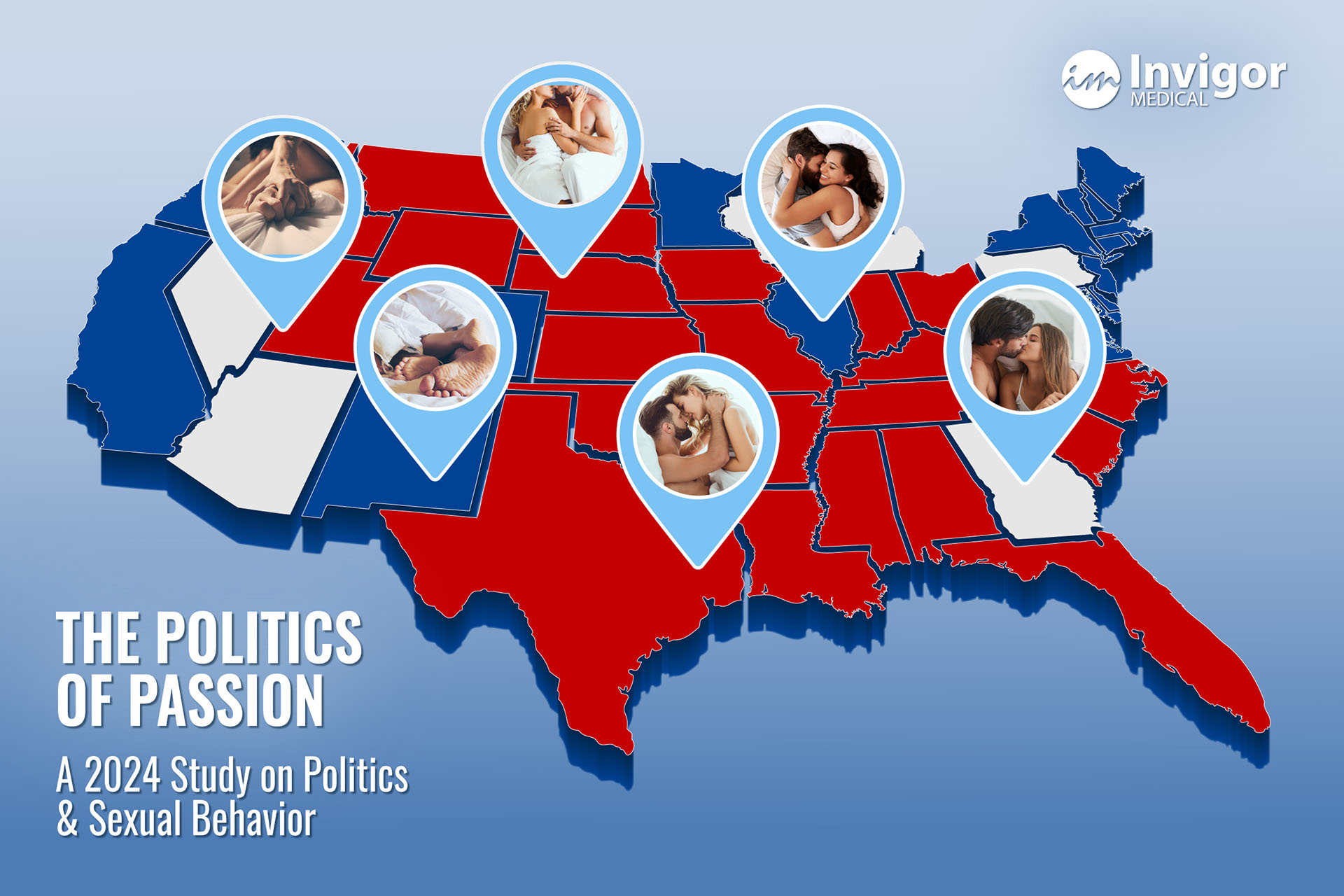Sexual behavior is often discussed through the lens of biology and personal experience, but it can be a reflection of the place you call home. The cultural and political climate of a state can shape everything from education to healthcare, and it turns out it might influence something as personal as your sex drive. In the United States, the examination of how political landscapes shape sexual behaviors provides a captivating glimpse into the intersection of culture, policy, and intimacy.
Exploring the differences in sex drive between red and blue states offers a compelling insight into the broader societal factors at play. We conducted a survey on how these political landscapes shape sexual behaviors. The results provide a captivating glimpse into the intersection of culture, politics, and intimacy.
Below, you’ll find specific trends and patterns that emerged from our survey. These findings provide valuable insights into how political affiliations can affect not only personal relationships and behaviors but also broader societal norms and expectations. Join us as we unpack the intersection of politics and passion, revealing how Americans’ political choices may influence their intimate lives.
Key Findings
- 6 out of 10 Americans are willing to continue sexual activity despite changes in their partner's political views.
- Only 7% of Americans believe matching political views with sexual partners is critical, regardless of ideology.
- At 25% and 23% respectively, Democrats and Republicans report similar rates of infidelity due to lack of sex in their relationship.
- Older millennials are most likely to be interested in sex with partners who have different political views.
Relationship Preferences Between Red and Blue States
Our survey reveals nuanced attitudes toward political alignment in relationships. The diversity of perspectives underscores the complexity of how political ideologies intersect with personal relationship choices across different regions.
In the Democratic-leaning state of California:
- 25% of Democrats are less likely to pursue a committed relationship with someone who doesn't share their political views.
-
Meanwhile, 44% of California Democrats remain open to such relationships.
- Among California Democrats, 27% of participants believe that a partner sharing their political ideology is not important.
- This contrasts with only 11% who find it very important.
In Texas, a predominantly Republican state:
- 12% of Republicans express reluctance towards engaging with those who have significantly different political beliefs.
- However, 15% of Texas Republicans are open to pursuing relationships despite political differences, which suggests a more nuanced perspective within the state.
Further, in Florida, another Republican-leaning state:
- 35% of Republicans believe that a partner sharing their political ideology is not important.
- This contrasts with only 5% of Florida Republicans who consider political alignment in relationships very important.
Moving to the Midwest, in Illinois:
- 10% of Democrats emphasize that having a partner who shares their political ideology is not important.
- However, only 5% of Illinois Democrats believe this is very important.
These findings highlight the importance of understanding regional differences in political and social norms when discussing relationship dynamics and preferences. Such insights are crucial for navigating the intersection of politics and personal life.
Variation in Sexual Norms and Activity Across Red and Blue States
According to our survey data, 31% of Republican participants report engaging in a moderate amount of sexual activity, two to three times per week. And at 34%, Democrats engage in a similar amount of sexual activity.
Besides the frequency of sexual activity, we also asked survey participants to rate their level of open-mindedness regarding sexual behavior on a scale from 1 to 5, where 1 indicates "not open-minded at all" and 5 indicates "extremely open-minded." Here's how respondents across different states rated themselves:
- In Texas, 18% of participants rated themselves as 5 (extremely open-minded).
- In California, 25% of participants rated themselves as 4 (very open-minded).
- In Florida, 28% of participants rated themselves as 3 (moderately open-minded).
- In New York, 28% of participants rated themselves as 2 (slightly open-minded).
- In Ohio, nearly 4% of participants rated themselves as 1 (not open-minded at all).
Moving beyond personal openness, our survey also explored societal norms regarding the possibility of committing to a partner with differing political views, revealing intriguing insights into how these attitudes shape relationship dynamics.
The Possibility of Committing to a Partner With Different Political Views
Political differences can significantly influence the dynamics of romantic relationships, shaping how individuals navigate commitment and compatibility. Our survey findings highlight diverse perspectives across states traditionally categorized as red (conservative) and blue (liberal), shedding light on how people approach the prospect of committing to partners with opposing political views.
In our survey, attitudes towards committing to a partner with different political views vary significantly across states. In California, 68% of residents consider themselves open-minded, and 75% are open to relationships with differing political perspectives, showing a moderate level of acceptance.
Comparatively, in more conservative states like Kentucky, a mere 18% of respondents are willing to engage in relationships with political differences. In swing states such as Virginia and Pennsylvania, there is more variability: in Virginia, 15% are less likely to pursue relationships with differing political views, while in Pennsylvania, the sentiment is more balanced, with 51% open to such relationships. Interestingly, in Texas, a red state, 46% are willing to pursue relationships despite political differences, indicating a slightly more open stance compared to other conservative regions.
Gender Differences in Relationship Dynamics
Interestingly, the willingness to date someone with opposing political views appears to be primarily influenced by political affiliation rather than gender roles.
On one side, a majority of Republican respondents — both men (57%) and women (59%) — express a greater willingness to overlook differing political views in a committed relationship. This could be because Republicans are typically thought to place a greater cultural emphasis on tradition and family values, where politics take a back seat to raising a family.
Findings are similar among Democratic respondents: 41% of male respondents and 50% of female respondents don’t consider differing political views as a dealbreaker in romantic relationships. Though the gap between men and women is similar regardless of political belief, this does indicate that, on the whole, Democrats are less likely to engage in romantic relationships with someone whose views don’t align with theirs.
Sexual Orientation and Relationship Compatibility
Exploring how sexual orientation intersects with political affiliation provides insights into relationship dynamics across varying political landscapes.
When it comes to heterosexual respondents:
- 17% of respondents are less likely to pursue relationships where their partner has opposing political views.
- Breaking it down by political affiliation, 52% of Democrats, 56% of Independents, and 59% of Republicans are open to such relationships.
For people who are homosexual, the impact of political views on relationships is also notable:
- About 37% of Democrats, 29% of Independents, and less than 17% of Republicans are less likely to pursue relationships with partners who differ politically.
- Conversely, 26% of Democrats, 64% of Independents, and 67% of Republicans are willing to engage with partners holding differing political beliefs.
We further examine how a couple's political beliefs can shape their relationship. This exploration will show how shared or divergent views influence their dynamics and decision-making.
To What Extent Can Differing Political Views Impact a Partnership?
Interestingly, regarding the influence of political views on sexual behavior within partnerships, Democrats appear to show greater responsiveness to their partners' evolving political perspectives. Among individuals already in partnerships, we found that:
- Only 9% of Democrats, 4% of Independents, and 7% of Republicans said they would stop engaging in sexual activity with someone if their political views changed significantly.
-
Of the respondents currently in a committed relationship, 68% of Democrats, 45% of Independents, and 63% of Republicans report having different political views from their partner.
Interestingly, when it comes to the impact of political views on sexual behavior within partnerships, there are similarities despite different political affiliations:
- Democrats in partnerships tend to be more open-minded with their own sexual behavior, with 55% reporting that they consider themselves very or extremely open-minded in this regard.
-
Independents show a similar trend, with 52% of respondents in committed relationships considering themselves open-minded with their sexual behavior.
- Republicans, however, exhibit slightly more reserved attitudes, with 47% expressing open-mindedness with their sexual behaviors in their partnerships.
This suggests that while political views can influence attitudes towards ideological differences within partnerships, they may also play a role in shaping sexual behavior and openness within intimate relationships.
A study about political party affiliation and romantic relationships found larger differences in relationship dynamics between Democrats and Republicans. 67% of Republican respondents reported that they were married, compared to only 45% of Democrats and 52% of Independents. Democrats display similar commitment levels, but primarily within formal unions, suggesting they may link relationship commitment more closely with official stages of development.
Generational Views on Choosing Partners with Similar or Different Political Beliefs
Our survey data provides intriguing findings regarding individuals' openness to engaging in sexual activities with partners of differing political ideologies across different generations. Some respondents indicated they’d actually be even more interested in. Here’s a generational breakdown:
Over the Age of 54 - Baby Boomers
- Democrats: 9%
- Independents: 3%
- Republicans: 11%
Age 45 to 54 - Generation X
- Democrats: 16%
- Independents: 8%
- Republicans: 10%
Age 35 to 44 - Older Millennials
- Democrats: 15%
- Independents: 8%
- Republicans: 14%
Age 25 to 34 - Younger Millenials, Older Generation Z
- Democrats: 13%
- Independents: 16%
- Republicans: 12%
Under the Age of 25 - Generation Z
- Democrats: 12%
- Independents: 10%
- Republicans: 6%
Willingness to Use Medications or Supplements to Enhance Sexual Activity
Politics significantly shapes access to sexual education, reproductive health services, and resources across the U.S. However, political affiliation does not seem to influence the use of medications or supplements to enhance sexual activity. According to our survey, 22% of Democrats, 20% of Republicans, and 20% of Independents reported having used medications or supplements to improve sexual function.
Other studies have found that political views play a significant role in shaping individual choices regarding sexual health across different states. In many red states, policies often impose restrictions on access to reproductive health services and prioritize abstinence-only sexual education. These policies can limit awareness and acceptance of sexual health resources, influencing attitudes towards sexual enhancement products and services.
However, this disparity was not reflected in our survey findings, where 38% of Democrats and Republicans, as well as 32% of Independents, expressed a willingness to consider using supplements and medications for sexual enhancement. This suggests a relatively consistent openness across political affiliations toward exploring options for sexual enhancement.
Openness to Sexual Experiences Among Democrats and Republicans
Political ideologies not only shape attitudes toward sexual health choices but also influence perceptions of various sexual practices and industries, such as sex work. These attitudes often reflect broader societal norms and values, impacting policies and public discourse surrounding sexual behavior and personal freedoms.
A divide exists between Democrats and Republicans regarding the acceptance of sex work. According to the survey, 53% of Democrats support sex work, or at least its decriminalization, compared to 42% of Republicans and Independents. This disparity highlights the influence of political ideologies on perceptions of sex work, with Democrats more likely to advocate for its decriminalization and regulation. Further, 21% of Republicans strongly oppose sex work, reflecting a more conservative stance typically associated with Republican values.
The survey also revealed that a majority of respondents consume pornography or similar adult content, with 62% of Democrats, 59% of Republicans, and 55% of Independents acknowledging this behavior. These figures indicate a relatively consistent pattern across political affiliations, suggesting that despite differing public attitudes, personal consumption of adult content is widespread.
The survey also revealed that a majority of respondents consume pornography or similar adult content, with 62% of Democrats, 59% of Republicans, and 55% of Independents acknowledging this behavior. These figures indicate a relatively consistent pattern across political affiliations, suggesting that despite differing public attitudes, personal consumption of adult content is widespread.
Infidelity and Its Connection to Reduced Sexual Activity Across Political Affiliations
Political affiliation often shapes views on monogamy and infidelity, reflecting deeper societal expectations and cultural norms. Infidelity due to a lack of sexual activity in a relationship also did not vary significantly across political lines.
Infidelity due to lack of sexual activity in a relationship was reported by:
- 25% Democrats
- 19% of Independents
- 23% of Republicans
This may indicate that fidelity is more strongly linked to sexual satisfaction within relationships rather than political beliefs or religious or moral principles.
Methodology
This study exclusively employed a survey method to explore the nexus between political affiliation and sexual behavior among residents of red and blue states across the United States. The survey aimed to collect quantitative data on participants' political views, sexual attitudes, and behaviors.
The survey encompassed participants aged 18 years and older, spanning a wide age range from young adults to adults above 54 years old. Demographic variables included gender identity, sexual orientation (heterosexual, homosexual, bisexual), and political affiliation (Democrat, Republican, Independent).
To capture regional variations in political climates, participants were categorized into red and blue states based on historical voting patterns in national elections. The survey aimed to achieve a balanced representation of diverse geographical locations across all 50 states.
Fair Use Policy
You are welcome to use the insights and findings from this study for noncommercial purposes, such as academic research, educational presentations, and personal reference. When referencing or citing this article, please ensure proper attribution to maintain the integrity of the research. Direct linking to this article is permissible and encouraged to facilitate access to the original source of information.











